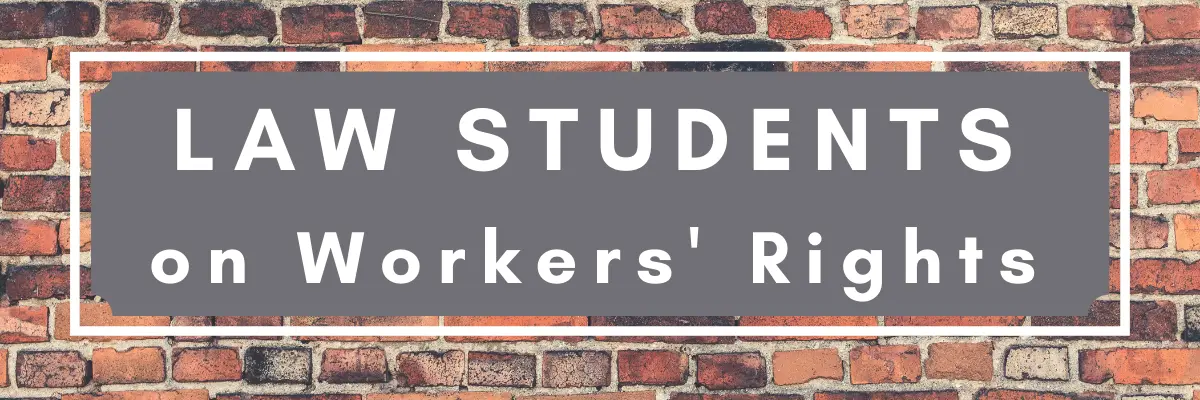
The COVID Vaccine And Workplace Rights
June 22, 2021
By Gabrielle Spisak
The Law Students on Workers’ Rights series publishes essays from current and incoming students at some of the top law schools in the country. These essays, submitted for the Charles E. Joseph Employment Law Scholarship, address the question “What are the biggest challenges facing workers’ rights in the future?”
The American dream is a paramount belief that anyone, regardless of the social class they were born into or where they came from, can live a successful life and pursue their dreams. Hard work is the foundation to obtaining the American dream. Many employers and employees could not have predicted the challenges that have come with the Coronavirus. However, as vaccines are becoming readily available to the general public, employers are working out the logistics of employees returning to an in-person workspace.
In various states, proof that an individual has received the COVID-19 vaccine is becoming a requirement for returning to the office. Proof of vaccinations is the biggest challenge facing workers’ rights in the future because it allows for workforce discrimination, can become a HIPAA violation, and hinders Title VII of the Civil Rights Act.
Workforce discrimination has come a long way from women and minorities entering the workforce to now the possibility or current reality (depending on the state an individual is employed) of vaccine requirements. Large national chains such as ALDI, Amtrak, Chobani, Darden Restaurants (Olive Garden, LongHorn Steakhouse, Cheddar’s Scratch Kitchen, etc.), Dollar General, Target, McDonald’s, and many more are offering special perks to their vaccinated employees. These perks include additional PTO, substantial monetary bonuses, rideshare credits, prizes, and more.
For smaller businesses, the American Rescue Plan (ARP) is providing tax credits to employers that provide paid leave to receive or recover from the COVID-19 vaccine. While employers may look at these incentives as a way to help stop a global pandemic, they are ostracizing employees who for various reasons cannot or will not receive the COVID-19 vaccine. Although some employers may not directly ask their employees to inform them if they are vaccinated, it will become evidently clear as incentives are and are not claimed by individuals. As one can imagine, this can lead down a dangerous path of discrimination against non-vaccinated employees.
In 1996, the Health Insurance Portability and Accountability Act (HIPAA) was signed into law. Part of the purpose of HIPAA was to help ensure that health information remains private and confidential. According to attorney Abbye Alexander, immunization records are protected health information under HIPAA. However, “employers may ask their employees whether they have received the vaccine, but they may only seek information from the employee’s medical provider with written authorization from the employee.”
Will no shoes, no shirt, no service become the new no vaccine, no job? As stated in our constitution, life, liberty, and the pursuit of happiness is an unalienable right. Providing for your family is not a luxury offered to a select few and therefore should be available to all individuals regardless of their vaccine status. Workers have a right to choose what is best for their health and should not have to worry about this right being stolen from them in the workplace.
For various reasons, people will choose to vaccinate or not to vaccinate against the Coronavirus. Title VII of the Civil Rights Act protects employees who will not vaccinate over sincerely held religious beliefs. Employers are required to provide reasonable accommodation if the sincerely held religious beliefs prevent an individual from obtaining the vaccination – unless the accommodation would pose an undue hardship. However, without a clearly defined definition of undue hardship, employers could argue that non-vaccinated employees pose an undue hardship.
A recent bill in Connecticut stopped allowing students to have a religious exemption from vaccines. They believed that the exception was being overused and ruled to eliminate the non-medical exemption from mandatory school vaccinations. This recent ruling is not too far off for a workplace setting and could certainly be used by an employer to infringe upon workers’ rights.
In conclusion, the freedoms that America was founded on are being challenged right now. Individuals have a right to work and provide for their families. Proof of vaccinations is the biggest challenge facing workers’ rights in the future because it allows for workforce discrimination by giving special perks and privileges solely to vaccinated employees. Obtaining vaccination records can easily become a HIPAA violation, therefore infringing on an employee’s right to privacy. Finally, Title VII of the Civil Rights Act, meant to protect religious rights, is not being upheld in the court system thus violating an employee’s constitutional right.
Reflections from Charles Joseph
What happens when public health clashes with individual rights? The debate dates back to the earliest days of our country, and as Gabrielle Spisak argues, the COVID-19 pandemic has brought those debates to the forefront again. Vaccines offer a valuable tool to fight the pandemic––but as Spisak points out, they can implicate workers’ rights.
Will employers violate workplace discrimination laws? Do disability discrimination and religious discrimination protections cover these situations? In many ways, these questions remain untested and unanswered––but we must keep workers’ rights at the forefront as we answer them.
Gabrielle Spisak holds a bachelor’s degree in marketing from Millersville University. In the fall, she will join the Widener Commonwealth Law School as part of the class of 2024. Contact Spisak on LinkedIn.
Charles Joseph has over two decades of experience as an NYC employment lawyer. He is the founder of Working Now and Then and the founding partner of Joseph and Kirschenbaum, a firm that has recovered over $140 million for clients.